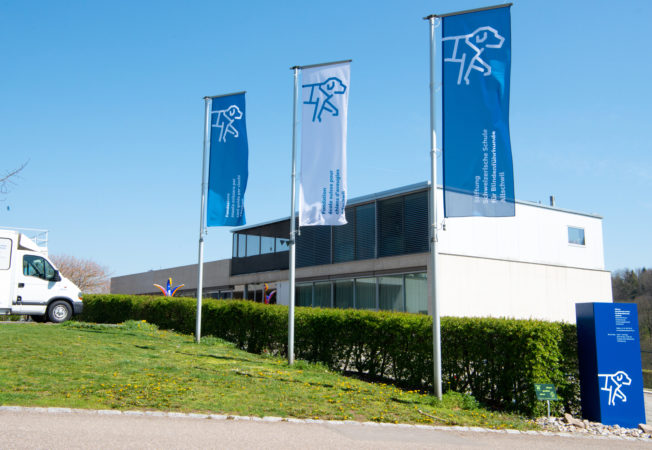
Since 1972, the mission of Swiss School for Guide Dogs for the Blind Allschwil has been to provide professionally-trained dogs to improve the lives of people who have a disability. About 50 employees and several hundred volunteers work together with great dedication to meet this goal. The school in Allschwil is the oldest and largest in Switzerland to produce Guide Dogs from its own breeding programme.
Not only do we train dogs, we also act as coaches to provide people with motivation and support – whether that’s when the dogs are introduced to their future keepers, or during our work with the foster families who take care of our puppies as they grow into adulthood, or supporting the volunteers who look after our breeding dogs, family dogs and dogs in their retirement period.
We take our time to train the dogs, and to make sure that our customers and their families are assigned the appropriate animal. We regard the relationship with our customers as one of lifelong care, and we make sure that they receive high-quality support in their dealings with the dog.
Disability, disease and age constraints must not act as barriers to people’s participation in public life. The school therefore supplies its dogs free of charge and takes care of the costs associated with keeping a dog if no funding is available from third parties (disability pension, health insurance scheme or on the basis of retirement pension age). The criteria used to decide whether a dog should be supplied follow the mandatory provisions of the disability insurance scheme and the Swiss Federal Department of Home Affairs (FDHA) criteria for the provision of aids and appliances (both websites available in German only).
The school has been an accredited member of the International Guide Dog Federation since 1999 and of Assistance Dogs International since 2014. It employs consistent quality standards in the areas concerned with breeding and training. These standards also apply to the induction period and the support provided for guide dogs (in the case of people who are blind or visually impaired), or assistance dogs for people who have a physical disability, or autism service dogs for families with children who have autism. The relevant accreditation is re-examined periodically, on a five-yearly cycle.
We know about the challenging living conditions faced by people with disabilities, and we’re aware that discrimination may take many different forms. We are mindful of the anti-discrimination provisions when we work with the keepers of our dogs. We scrutinise our processes on a regular basis in order to safeguard our customers’ dignity and autonomy.
Inclusion begins with admittance and accessibility. The school provides all of its most recent information sources – e. g. website, forms and film productions – in an accessible way. Our courses and advanced training options also take account of the needs of people who have a disability.
We breed dogs so that they are able to help people. Our dogs are raised and trained with love. Their wellbeing is important to us, and always will be, on a lifelong, non-negotiable basis. Our dogs will therefore continue to be owned by the school at all times, precisely so that we can be absolutely sure of their welfare. The people who keep our dogs recognise and appreciate this, as do the general public and our sponsors. In order to safeguard each dog’s needs, the school undertakes personal discussions and home visits to check that the physical and psychological aptitudes of the keeper and the time they have available are adequate to provide safe and appropriate conditions for the dog. If we discover a dog that is neglected, seriously overweight or showing behavioural problems, we will support that dog’s keeper to remedy the problem.